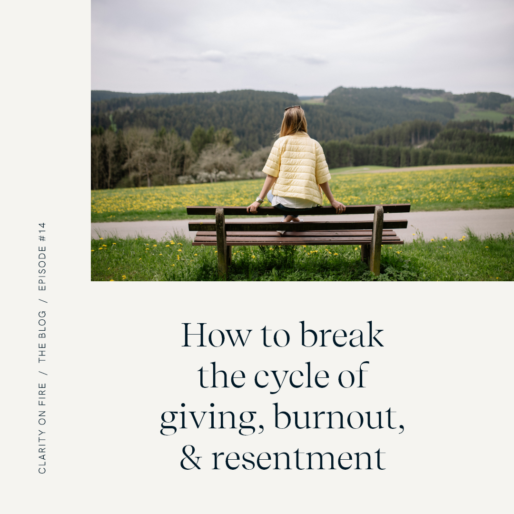If reading long blogs just isn’t your deal, you can listen to me read it instead! Click the play button below, or subscribe and listen through our podcast on iTunes, Stitcher, or Google Play.
Podcast: Play in new window | Download
If there’s one line I’ve heard from just about every client I’ve coached over the years, it’s this:
“I really just want to help people.”
Look, I get it. It’s human nature (well, the good side of human nature, at least!) to want to help and support and lift up other people. Life would be pretty unfulfilling if you never felt like you were making a positive difference for other people.
Plus, it just feels good to help others. Who doesn’t enjoy the warm, satisfied feeling they get after doing something nice for someone?
But being a nice, helpful, giving person can very quickly go too far. And it’s not pretty when it does.
Over-giving is a fast road to burnout. And not feeling appreciated for all the things you do for others, or not receiving the same kind of support that you’re always giving, leads straight to resentment.
THE MADDENING LOOP DE LOOP OF OVER-GIVING
There’s a predictable cycle when it comes to over-giving, and you’re probably already very familiar with each stage. It looks something like this:
Stage 1: Abundant giving
This is the stage when you try to help ALL the people and be everything to everyone.
You’re constantly checking on whether everyone else — your coworkers, your spouse, your kids, your clients, your parents, your friends — is taken care of and happy. You’ll work more, sleep less, and put off taking care of yourself because other people need you more.
To someone who loves helping people, the abundant giving stage feels great … until it doesn’t.
Which leads to…
Stage 2: Burnout
After an extended period of abundant giving, you notice that you have less and less energy. It’s like there’s a slow energy leak in your body, and you don’t know how to plug the leak.
Most likely, you’ll try to keep being there for the people in your life, since your desire to give is still strong, but your energy level is seriously flagging and you can’t seem to keep up with all the demands.
You feel like you could take a nap for a week straight, if only people would stop emailing you, and asking you for things, and needing your constant attention.
When your exhaustion hits a breaking point, that’s when you nosedive straight into…
Stage 3: Resentment
This is when you get pissed. You’re overworked, exhausted, and underappreciated, and you feel the frustration threatening to bubble over.
Your resentment is often directed externally at people in your life, and looks something like, “He doesn’t appreciate everything I do for him!” or “She never gives ME any support. I have to do everything on my own.”
But it can also be directed inward, at yourself. As in, “I always do this. I pushed myself too hard again. What’s wrong with me? Why can’t I be more resilient? I’m just too sensitive.”
Once you vent out your frustrations and spend some time recuperating, you’ll start to feel guilty for your resentment and for not giving as much as usual … and the cycle starts all over again, on an endless loop.
ADDICTED TO BEING HELPFUL
So what causes someone to over-give in the first place?
I think it’s usually one of three reasons (and let’s be honest, it’s often a combination of all of them):
- People pleasing: The high that comes from helping other people can be addicting. Plus, being nice and helpful and supportive practically ensures that most people will like you, and likeability is one of the most potent drugs out there. Once you get addicted to people pleasing, you’ll twist yourself into a pretzel trying to be liked by everyone you encounter.
- Conflict avoiding: Nobody loves conflict, of course (unless you’re a sociopath who likes stirring up drama for amusement), but to a person who’s giving and empathic by nature, it’s petrifying. Which means your tendency to over-give might be your way of keeping the peace so no one ever has a reason to get angry with you. If you’re always doing nice things, then no one can ever get mad at you, right??
- Misunderstanding your self-worth: This one breaks my heart most of all. Too many of us — especially those of us who have been repeatedly called “nice,” “kind,” “and caring” throughout our lives — have mistakenly come to associate our very worth as a human being with how much we can give. Which means you have to constantly keep proving your worth by over-giving to everyone in your life, or else you’re “not a good person.”
IT’S TIME TO BREAK THE CYCLE
The first, and most important way to stop over-giving in the first place is to remember that your worth is not tied to how much you can give.
Let me repeat that: Your worth has absolutely nothing to do with how much you give to others.
You are worthy simply by being a living, breathing human with hopes and desires and preferences and a unique personality. Your worthiness has no relation to what you do and everything to do with your mere beingness.
When you wholeheartedly believe that fact, you actually get to be of MORE service to others because you’re giving from a full tank, not a desperate need to prove yourself.
I also want you to shift your perspective on what it means to be a giving person in the first place.
When you think about how you can help others, I want you to include yourself in that. As in, if it doesn’t help other people AND you, then it doesn’t count as a truly giving act because it’s only one-sided.
It’s about looking for the win-win. If it doesn’t serve you and other people, that’s not a win-win, and ultimately everyone loses.
So that means saying “no” to any opportunity to be of service that’s going to seriously deplete you. There will be plenty of other ways to help others that will feel energizing and refueling to you — save your energy for those things.
For more strategies on how to break this cycle, make sure to listen to our next podcast episode coming out this Friday, which is all about how to cure your people pleasing habit.
So tell me, have you ever found yourself caught in the middle of the giving-burnout-resentment cycle? (Or are you there right now?) How ready are you to break this cycle? Share with me, in the comments!
FOR MORE SUPPORT WITH THIS…
Want support with this issue (or any other challenge you’re facing in your life or career)? You may want to consider working with us through 1-on-1 coaching, the most powerful way to get clarity, direction, and individualized support around anything you’re struggling with. Find out more here. If you’re seriously considering 1-on-1 coaching, fill out this form to chat with one of us about the possibility of working together.
Much Love,
Kristen (& Rachel)




I am at level of burn out- resentment especially on family members. Its hard coz i am a people pleaser, avoid confilct and believe that my family should not suffer if I can help. Gotten myself into debt and now am slowly getting out of it. I peg my cash to the last coin to avoid any liquid cash. Thank you for the article you described me perfectly.
Glad this post resonated with you, Zips! It’s really admirable that you care so much about your family, but you’re right that the people pleasing can definitely go too far. If you haven’t yet listened to our podcast episode about people pleasing, I think it might help you a lot!
I found this blog entry interesting because I have struggled all my life with people pleasing and trying to avoid conflict. I always experience the cycle of burnout, resentment, and then guilt. I have realized how important it is to receive as well as give. I think the most profound statement made in this blog entry that I have learned this past year is that an empty vessel can’t really give wholeheartedly. In other words at some point, you just start giving as a habit or an autopilot action but in doing that your heart isn’t in it and eventually it shows. People can feel energy and vibes and the signals that you are giving off even though you are smiling on the outside. Eventually, it will eat at you until you know you have to give to yourself.
Victoria — It sounds like you’ve already learned some deep lessons about the need to receive and take care of yourself, instead of always putting other people first. I’m glad this post validated what you’ve already experienced on a personal level! And yes, you’re right that the MOST important lesson for a people-pleaser to learn is that an empty vessel can’t give wholeheartedly. Thanks for reading!
thank you for sharing this. I’m at burnt out level of resentment with my family member. Its just so hard when it come to family and how to deal with them.
You’re right — family can definitely be the hardest when it comes to people-pleasing and feeling resentment! Make sure to check out our podcast episode about people pleasing, if you haven’t already. I think it will help you a lot!
I’ve been following you guys and what you do for years now. I am so thankful for all the help, wise words and practical advice you’ve given me and so many other people. You both are an inspiration for many. Thank you, thank you, thank you.
Thank you so much for this comment, Sharon! We appreciate people like you listening and reading. It makes our day!
I’ve just listened to your podcast episode regarding people pleasing and can I just say thanks so much for making that episode. I’ve been a chronic people pleaser for as long as I can remember, but it has always frustrated me that I had a great childhood and upbringing, so it frustrated me that I could never understand why I behave that way (not going to say ‘I am’ a people pleaser anymore!), but to understand that it may have been a subconscious part of the way my parents raised me has just opened my eyes. I no longer feel even more awful about the way I act because I can understand why now.
My biggest fear about this all though is what if the real me is not a nice person? I have no idea who the real me is and it sometimes scares me to find out, but I have to try!
Hey Samantha,
In the same vein as parents who worry whether they’re bad parents or not — if you’re asking, you’re probably a good parent. Because bad parents don’t realize they’re bad, and don’t have the self-awareness to wonder or worry about it. So in your case, I can pretty much guarantee you’re a nice person. Because not-nice people wouldn’t even be asking!
Wow. Over-giving. At least my over-sharing of personal info won’t be alone! I’ve never thought of it that way before. I grew up with a father who ‘demanded’ loyalty, ‘demanded’ the truth at all times and drilled into me that everybody else’s opinions mattered more than my own. I can only describe it as brainwashing. I can see more how my burnout at work is because I over give there, how my friendships crumble because I over give and don’t understand why I don’t get the same support in return – oh the resentment is palpable. Its been hard to put myself first as I immediately feel selfish – as if I have all this energy that could help others in need. But I’m in need and ignoring the most important person in my life – Me!
I’m sorry that you grew up with that kind of parent, Chris. You’re right to call it brainwashing! You established a setpoint in childhood that was totally about other people and not at all about you, so it’s natural that anything focused on you feels selfish in adulthood. I hope you’ll consider join us for Getting Over People Pleasing! What you’re going through is a big match for what we’re doing in that course. 🙂 We haven’t run it in 2 years, so your timing is great! https://clarityonfire.com/gopp/
Bingo!
I’m totally wiped out with resentment right now….i feel the I give I give I give and get nothing in return burn. I’ve trained everyone that I will take care of everything and 25 years later I’m suffering the resentment effect. Can’t get out of it.